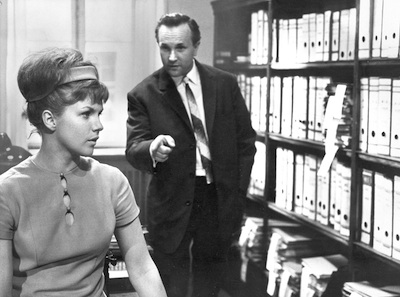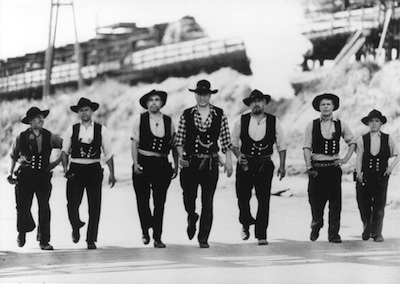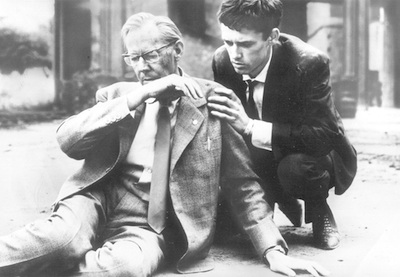East German Film Festival Spotlights Banned Films
A film festival this month at the University of Scranton will offer local movie buffs the chance to see three 1960s films that were banned in Communist East Germany.
The seventh annual East German Film Festival, “The ‘Rabbit Films’ Revisited” takes place on Oct. 24, 29 and 31 in the University’s Pearn Auditorium of Brennan Hall. The screenings each begin at 7 p.m. and are free and open to the public.
Each year the University’s Department of World Languages and Cultures presents the festival in collaboration with the DEFA (Deutsche Film-Aktiengesellschaft) Film Library at the University of Massachusetts, Amherst. The library is the only archive and research center outside of Germany devoted to films from and related to the former German Democratic Republic.
This year’s event focuses on a collection of movies known as “Rabbit Films” after the title of one of them, “The Rabbit is Me.” The Socialist Party of the German Democratic Republic denounced them as inaccurate, irresponsible and anti-socialist. Some of them were not widely seen until after the fall of the Berlin Wall in 1989.
The ban stemmed from the first generation of directors trained at the East German Academy of Film in the years after World War II. They set out to make films similar to those of the West, such as the works of the European New Wave and Italian Neorealism. After the construction of the Berlin Wall in 1961, artists felt free to experiment. Because the East German government had previously justified limitations on freedom of expression as defenses against Western imperialists, filmmakers thought the new wall and its containment of East Germans would allow for critical discussions about how to improve socialism.
As a result, they made films that depicted life in East Germany and its problems. The movies emphasized the perspectives of young people who often shared the ideals of socialist society but struggled with the practical implementation of those ideals and the limits on individual freedoms they engendered.
In 1965, the Eleventh Plenary Meeting of the Cultural Sector of the Socialist Party shocked the artistic community by rolling back reforms, banning a dozen films that the Party believed had gone too far with their criticisms of the state. They comprised almost an entire year’s production of feature films by the state film studio, DEFA, and made up more than 25 percent of all the films that were banned during East Germany’s 41-year existence. They came to be known as “Rabbit Films” after the title of Kurt Maetzig’s film, “The Rabbit is Me.”
The following “Rabbit Films” will be screened at this year’s festival: Thursday, Oct. 24: “The Rabbit is Me”, Tuesday, Oct. 29: “Trace of Stones”, Thursday, Oct. 31: “Just Don’t Think I’ll Cry”
 (1965, 118 minutes, black-and-white).
Directed by Kurt Maetzig, the movie is based on a novel by Manfred Bieler. It
tells the story of a 19-year-old girl, Maria, whose application to study at a
university is denied when her brother Dieter sentenced to three years in prison
for anti-state activities. To her own surprise, she falls in love with the
judge who presided over her brother’s case. A family conflict ensues when her
furious brother is released early from prison. Although completed in 1965, the
film was not released to the public until 1990. (7 p.m. Pearn Auditorium,
Brennan Hall. Free.)
(1965, 118 minutes, black-and-white).
Directed by Kurt Maetzig, the movie is based on a novel by Manfred Bieler. It
tells the story of a 19-year-old girl, Maria, whose application to study at a
university is denied when her brother Dieter sentenced to three years in prison
for anti-state activities. To her own surprise, she falls in love with the
judge who presided over her brother’s case. A family conflict ensues when her
furious brother is released early from prison. Although completed in 1965, the
film was not released to the public until 1990. (7 p.m. Pearn Auditorium,
Brennan Hall. Free.)
 (1966, 138 minutes, black-and-white).
Frank Beyer directed this film, based on an Erik Neutsch novel. This film tells
the story of conflicting approaches to common goals on a building site and the
unlikely alliance forged among a young female engineer, a new party secretary
and an experienced brigade leader. Like “The Rabbit is Me,” it also was not
shown until 1990. (7 p.m. Pearn Auditorium, Brennan Hall. Free.)
(1966, 138 minutes, black-and-white).
Frank Beyer directed this film, based on an Erik Neutsch novel. This film tells
the story of conflicting approaches to common goals on a building site and the
unlikely alliance forged among a young female engineer, a new party secretary
and an experienced brigade leader. Like “The Rabbit is Me,” it also was not
shown until 1990. (7 p.m. Pearn Auditorium, Brennan Hall. Free.)
 (1965, 91 minutes, black-and-white) Directed by Frank Vogel, this film
was singled out for public attack during the Eleventh Plenary Meeting. The plot
follows a high school student who is expelled from school after turning in a
provocative essay and has nowhere to turn. (7 p.m. Pearn Auditorium, Brennan
Hall. Free.)
(1965, 91 minutes, black-and-white) Directed by Frank Vogel, this film
was singled out for public attack during the Eleventh Plenary Meeting. The plot
follows a high school student who is expelled from school after turning in a
provocative essay and has nowhere to turn. (7 p.m. Pearn Auditorium, Brennan
Hall. Free.)
For more information about the film screenings, please contact Jamie Trnka, Ph.D., associate professor of world languages and cultures, at 570-941-7430 or Jamie.trnka@scranton.edu.






